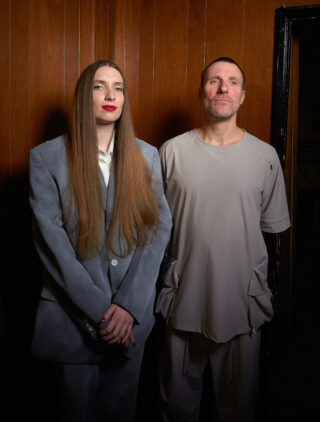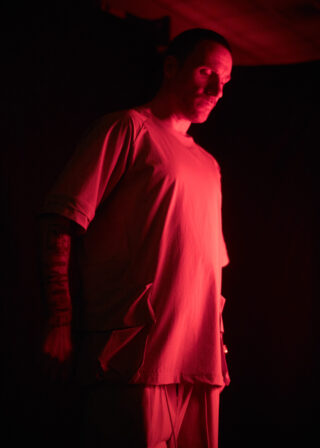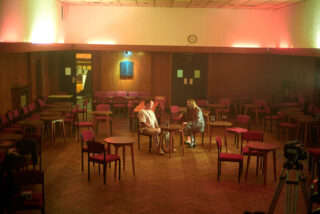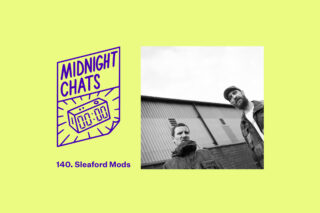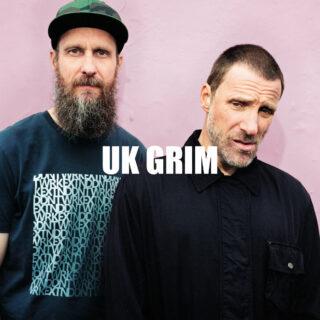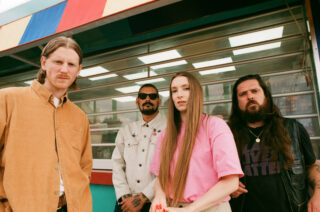[This article originally appeared in issue 157 of Loud And Quiet. Published January 2023 ]
“In England,” warns Jason Williamson during the opening track of Sleaford Mods’ 12th album, UK Grim, “no-one can hear you scream.”
Though it’s a decade since Sleaford Mods’ breakthrough release Austerity Dogs, Sleaford Mods have never sounded quite so skeletal and haunted as they do here. The undeniable national decline tracked across those records is now complete. If you thought it was bleak last time, well – as our 2020 cover feature with the duo portented – it turns out that things can’t only get better. Happily, UK Grim is an album that continues to progress the group’s wilfully stark sonic blueprint, most notably on ‘Force 10 From Navarone’, which features a guest spot from London art-rock group Dry Cleaning’s Florence Shaw. Though Sleaford Mods may not always be known for their warm and hospitable attitude towards their contemporaries – check the violent fantasies on UK Grim’s absurdist ‘D.I.Why’, aimed squarely at post-punk acts and “white bloke aggro bands” that Sleaford Mods may or may not have influenced – Williamson is notably proud of collaborating with Dry Cleaning. On latest album Stumpwork, Shaw’s free-associating Rolodex of pungent imagery and anxious recollection made that record one of our albums of 2022. Here, her laconic, deadpan sprechgesang is the perfect foil for Williamon’s chanted punk fury. In mid-December, I sat the pair down to discuss ‘Force 10 From Navarone’, the writing process, therapy, horror films and “adult Christmas.”
Florence Shaw: Have you had a haircut?
Jason Williamson: Yeah (runs hand across shaven head) I went to the barbers and he went, “This is really in fashion at the minute.” I don’t want anything in fashion at the minute! What you on about?!
FS: I bet that made you feel really stupid!
JW: I still tipped them like £10 because they’re really good. Ha.
Fergal Kinney: You’ve collaborated for a new track on UK Grim, ‘Force 10 From Navarone’. How did you two working together come about?
FS: It was quite a while ago wasn’t it?JW: It was an Instagram DM. I thought, “Should we do this properly, through managers?” Then I thought, “Fuck it.” I heard the song, and it was quite apparent that your presence on it would be really good. Being as we were acquainted anyway through the tour, I didn’t have a problem DMing you and popping the question.
FS: Sometimes it being through managers it can feel more like the unknown. Or sometimes you can say a reply that’s really blunt and the manager makes it sound really polite [laughs]. That can be handy. But on this occasion? It felt very normal. A very normal request and very normal to say yes.
JW: Because we’ve been going for years and years you do get concerned that people are like, “Yeah, you’re okay but no.” So I was extra chuffed when you said yes, as you can imagine.
FS: From very early on, when we put out our first EPs, we noticed that you’d put us on playlists that you’d made and that always felt like a big deal. In our band we always felt unsure if anyone would listen to it. We weren’t overly confident. We were confident that we liked what we did but in terms of an audience? Not at all. So that was very exciting for us. We noticed you and Andrew would always do things to show support for us.
JW: It’s nice when bands come along that you really like, a lot of the time stuff doesn’t really click with you. Your EPs, it was prominent, but it was work-in-progress, without being insulting. I love stuff that’s slow burning, you can see it, and as a unit from a spectator’s point of view you come across as quite tight and definite. There’s lots of honest application going into it – do you know what I mean?
FS: That’s nice to hear, that something we’re trying to do comes across. Because more than half the things I’ve made in my life haven’t come across at all! I’ll have made this drawing and thought everyone would be blown away by it, and people don’t really get what it means, so it’s nice to make something that strikes a chord with somebody.
JW: Your drawings are really skeletal aren’t they. You’ve got to look at it and figure out why you’ve done it. That’s what people do with art I guess. I’ve got some on my laptop though, I get them totally.
FS: I’ve probably got a short attention span for some things.
JW: Yeah, totally, I lose interest very quickly. Though over the years I’ve learnt how to water a song. Plant it, start watering it, start feeding it, a bit like a Christmas cake. If it’s not gelling straight away I’ve learnt to be more patient, to give them more time and not just bin them, which I used to do.
FS: I’ve honed this process where I spend five minutes on something and if I start to hate it I stop, and then I put it away and try again in about a week. In that way, I tend to work on songs for about a year, but obviously not a year. I’m popping in and out. I just start to totally tear it down and find everything wrong with it, which I need to fight in order to put things into the world. I used to think that something had to be really good to show it to someone. I learnt that if you wait to like something, you’re never going to show anyone anything.
JW: No, ever, ever.
FS: A lot of times I’ll share something with the world and I’m like, “I don’t know about this. I don’t know if I like this.” But at the same time it’s what I’ve made. It is what it is.
JW: What do you try to convey in drawings? Is there a general theme or are your individual pieces all differently themed?
FS: I think it’s the same as writing. This is maybe true of everybody but I’ve got an inner world, a way of seeing things – and I don’t mean in, like, an amazing way – just the way I interpret things, which is often wrong and different to more right-headed people around me. Doing drawings or writing is trying to externalise it, make something that feels like me – it’s quite insular really. Talking to myself, almost like a comforting thing. Sometimes tour can be not very creative and I find on tour I’ll start to get a bit bleak, and I figured it’s because you don’t make or do anything. Recently I’ve tried to do a drawing or talk into my phone. That really helps.




